Drawing on in depth institutional knowledge, hundreds of case studies, and scores of internal and external reports and evaluations, Foreclosing the Future: The World Bank and the Politics of Environmental Destruction is the story of larger-than-life personalities, international intrigue, and human suffering brought about by a winner-take-all economic globalization. It reveals the World Bank as a microcosm of global politics, where governments and markets are failing to address the most urgent challenges facing our world.
The World Bank Group proudly proclaims "Our dream is a world without poverty." Supported by the U.S and other rich nations, it lends more than $60 billion every year to developing countries--purportedly for projects that help the poor while protecting the environment. In fact, the Bank often contributes to the very problems it claims to be solving.
Foreclosing the Future reveals how the Bank, the Vatican of international development finance, has subsidized the world's richest corporations, supported industries that drive climate change, and loses as much as thirty percent of its loans to corruption. Perhaps most disturbing, the author shows how decades of internal World Bank reports uncover the same institutional flaws, yet have no impact on lending.
The book recounts dramatic controversies over giant hydroelectric dams, Chinese resettlement schemes in ethnic Tibetan areas, massive mining and oil projects, and convoluted Rube Goldberg global carbon trading schemes. These scandals have provoked resistance from poor, disenfranchised communities. They have also prompted attempts at reform from Bank presidents, from the bold James Wolfensohn and the contested Paul Wolfensohn to the current Jim Yong Kim.
The book's negative assessment of Kim's tenure reinforces a call for real leadership so that the Bank can learn from experience rather than flee from it.
Review Quotes
"Foreclosing the Future carefully documents the World Bank's adherence to 'pushing the money out the door,' refusing to learn from past mistakes, tolerating corruption, trashing the planet, and evicting the poor—all in devout service to a mis-measure of wealth. Bruce Rich gives a tragic, honest, and well-argued account of the decline of a once-promising institution." —Herman Daly, Former Senior World Bank Economist, Professor Emeritus, School of Public Policy, University of Maryland
"A compelling account of the past two decades of global environmental politics as played out in the world's leading development institution. Foreclosing the Future underscores that the need for public scrutiny of international financial institutions is as great as ever." —Senator Tom Udall, New Mexico, Senate Foreign Relations Committee, Senate Appropriations Committee
"Deeply-researched and filled with heretofore publicly unavailable Bank documents.... His book argues thoroughly and methodically that the Bank's permissive attitude towards environmental destruction has continued, if not worsened, in the past decade." —New Republic
"The strength of the book is its dissection of the Bank's approach to climate change."—Financial Times
"Lawyer Rich (Mortgaging the Earth), a knowledgeable critic, focuses on the World Bank’s environmental failures. The author documents similar catastrophes—environmental, economic, and political—elsewhere and chides the organization for its feeble defense: that private-sector funding for economic development would come with fewer safeguards and result in more rapacious policies." --Publisher's Weekly
"Rich's most valuable insights concern how often the World Bank has been informed – by its own internal review boards, no less – that its policies have not reduced poverty so much as hastened environmental destruction and enabled corruption by public officials in developing nations. Nevertheless, the bank has gone on 'pushing money out the door'—giving large loans that make it appear to be moving heaven and earth on behalf of the poor but in practice often do the opposite." —OnEarth
".Offers a passionate and sharp-tongued but well-informed analysis. Rich doesn't spare the World Bank management with critique, but is aware that the buck doesn't stop there." —Huffington Post
"Bruch Rich paints a vivid picture of the environmental damage that civic groups, governments, corporations, and the multinational lending sector have all grappled with over the past years." —Daniel Kammen, Distinguished Professor of Energy, University of California, Berkeley; former Chief Technical Specialist for Renewable Energy and Energy Efficiency, World Bank
"As well as presenting powerful arguments for reform, the book is crammed full of facts about the Bank and international development finance. It also documents two decades of civil society campaigns to hold the Bank accountable and promote reform. For these reasons, it will be of great interest to civil society activists and campaigners in the North and South." —The Ecologist
"This book offers an important pooling of evidence that should guide both scholars and practitioners in their understanding of and work with development in general and the World Bank specifically. Rich's volume is an important addition to the conversation on the role and impact of the World Bank and should receive careful and serious attention in efforts to reform the Bank and truly alleviate global poverty while preserving the world in which all people must live." —Poverty & Public Policy
"Based on his expertise and numerous case studies, as well as internal and external reports and evaluations, Rich gives a compelling account of the past 20 years of global of global environmental politics played out in the world's leading developmental institutions." —Choice
Summary, Excerpt, and Blog piece
1. Foreclosing the Future: Examining 20 years of the World Bank's Environmental Performance-4 page summary 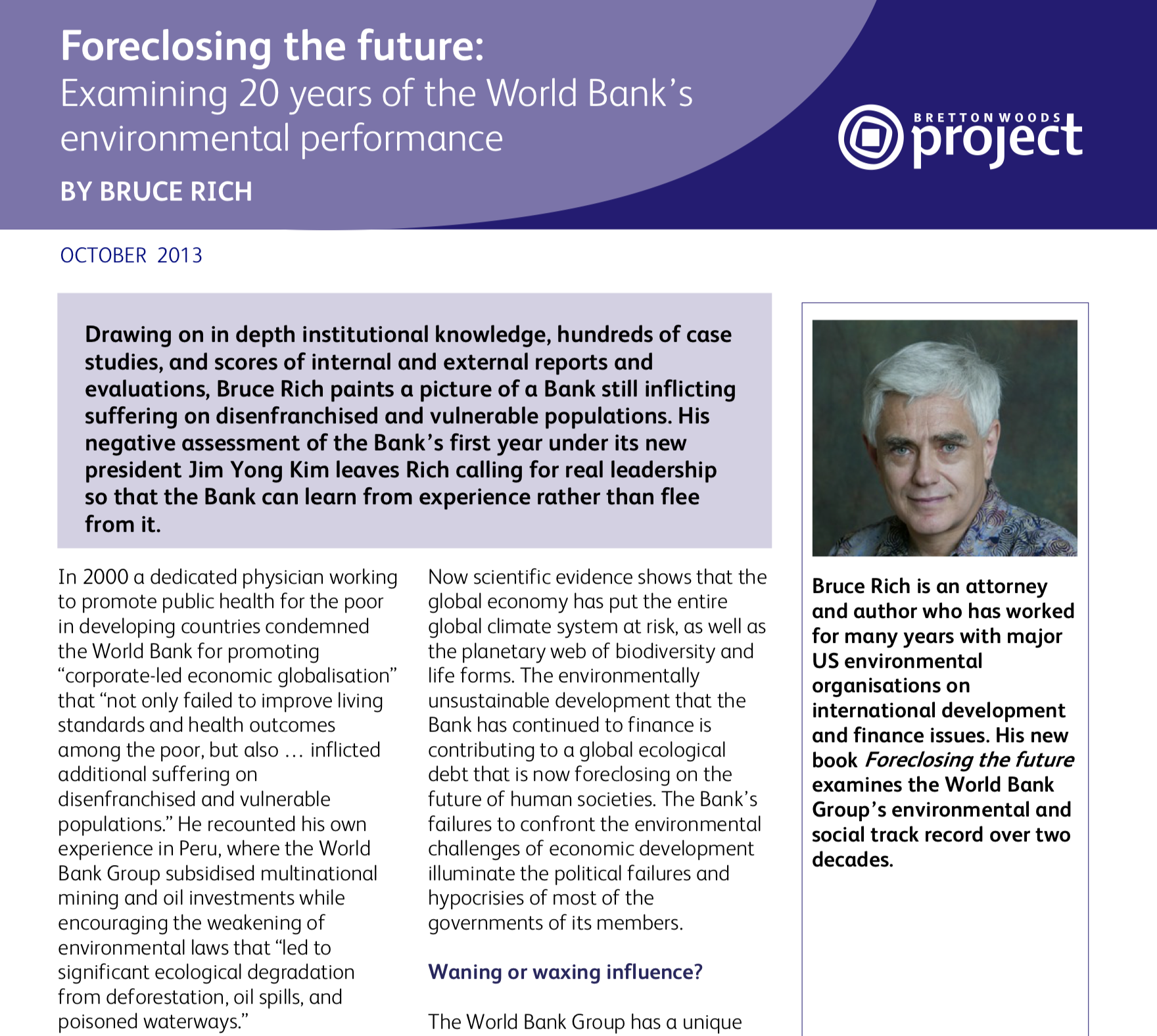
published by the Bretton Woods Project, October, 2013
https://www.brettonwoodsproject.org/wp-content/uploads/2013/10/At-Issue-Bruce-Rich-FINAL.pdf
2. Excerpt published on Alternet

"How the World Bank is Hurling Us Toward Environmental Ruin," December 2, 2013.https://www.alternet.org/2013/12/how-world-bank-hurtling-us-toward-environmental-rui
3. Foreclosing the Future: The World Bank and the Politics of Environmental Destruction
blog published in Triple Crisis: Global Perspectives on Finance, Development, and the Environment, July 16, 2013. http://triplecrisis.com/foreclosing-the-future-the-world-bank-and-the-politics-of-environmental-destruction/
Climate Change and the World Bank: Analysis in Foreclosing the Future
These two essays appear in the web blog and discussion forum "REDD-Monitor." Chris Lang is thr editor of REDD-Monitor. REDD is the acronym for a United Nations-World Bank supported scheme for international trading of carbon credits to preserve tropical forests as carbon sinks:
1. The Carbon Caravan, REDD-Monitor, February 25, 2014
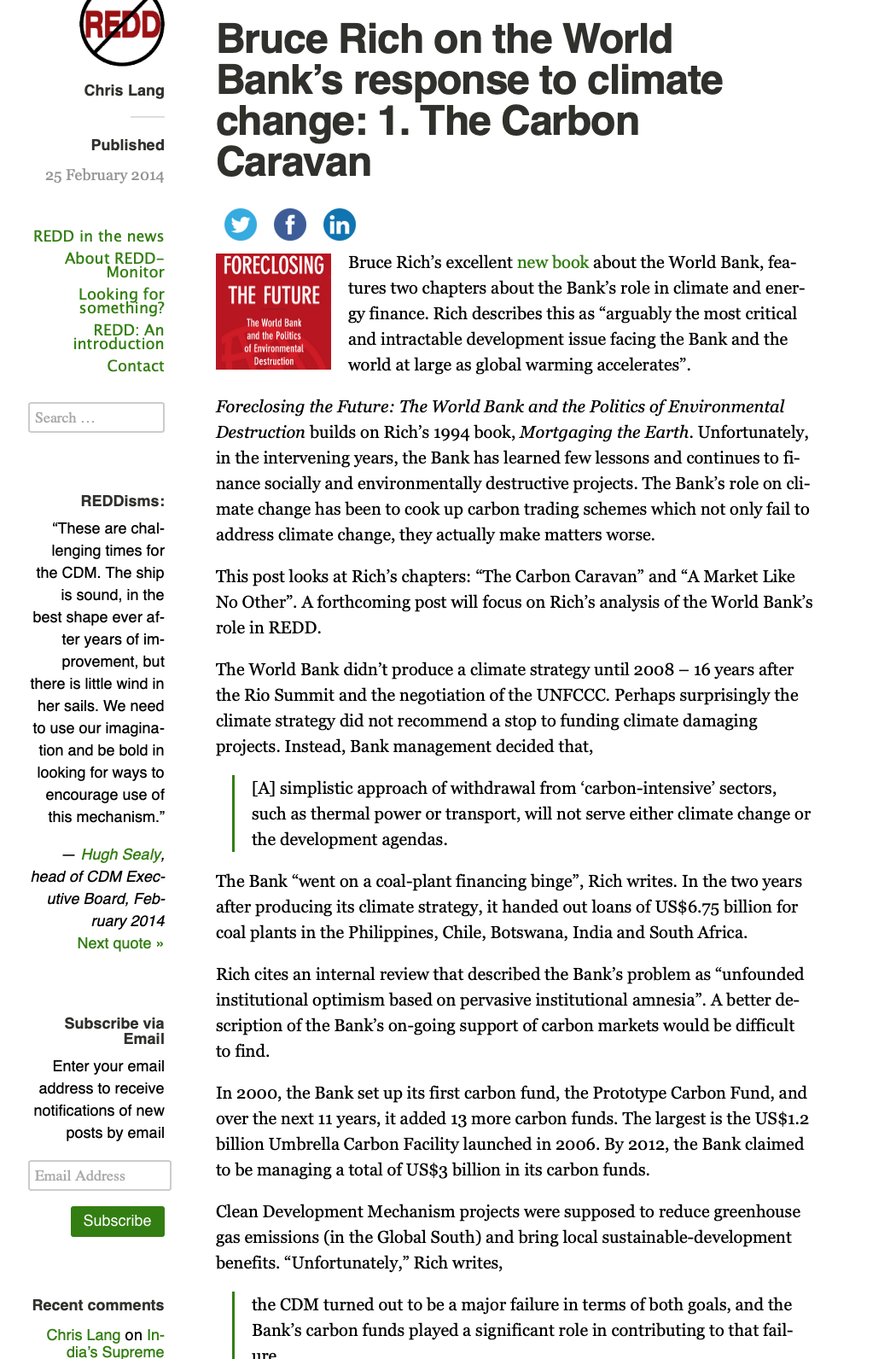
World Bank energy lending, support for fossil fuels and gian coal plants, and climate strategy
2. The REDD+ Program is "in denial about the intractable challenge of governance," REDD-Monitor, April 9, 2014.
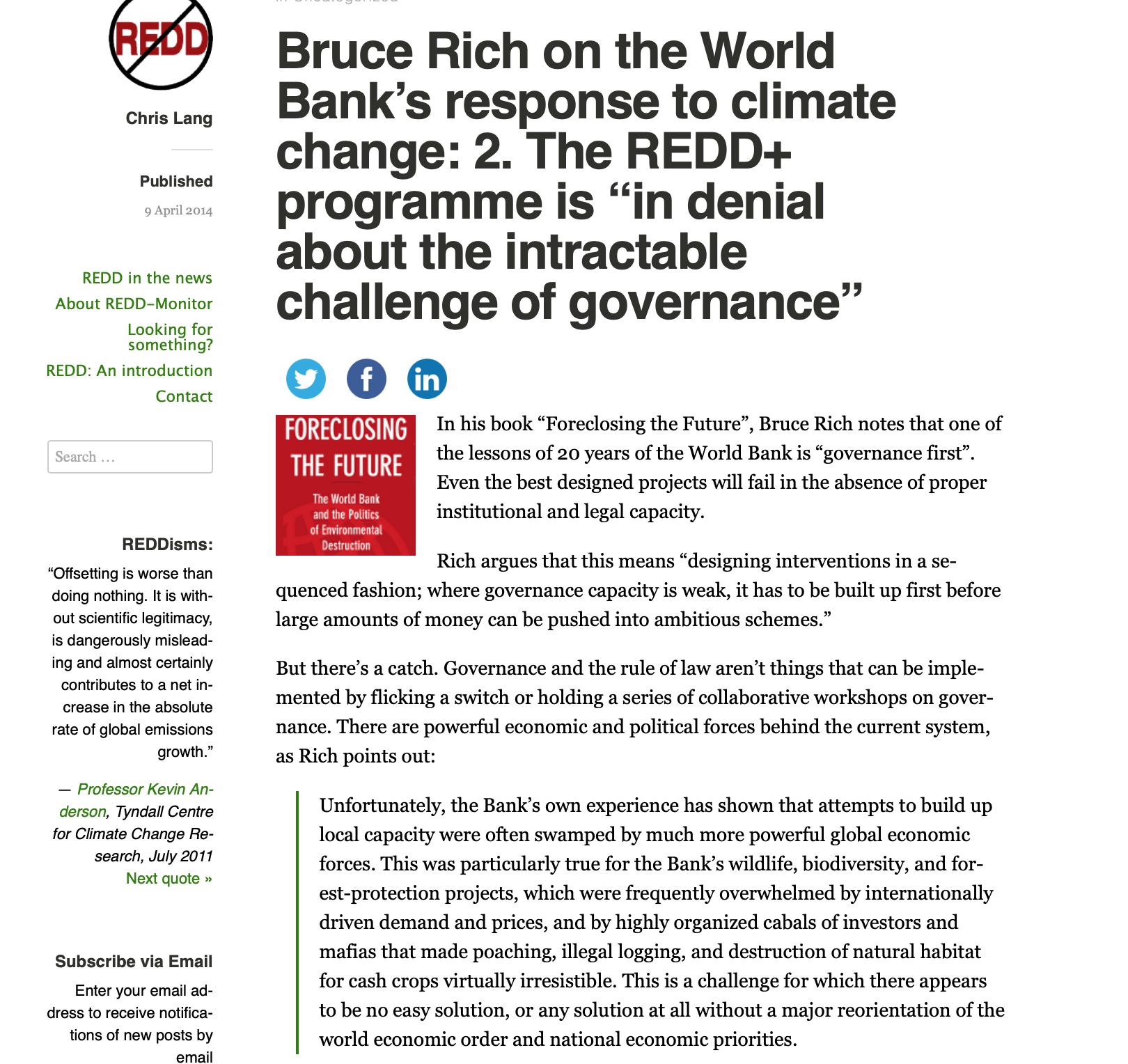
Reviews
1. Huffington Post, Why the World Bank Continues to Fund Environmental Destruction, by Peter Bosshard, December 6, 2017.

https://www.huffingtonpost.com/peter-bosshard/why-the-world-bank-contin_b_4060428.html
"Bruce Rich illustrates the contradictions of the World Bank’s lending culture through an extended series of projects and initiatives. He describes dams that impoverished local communities and fostered corruption, forestry projects that caused massive deforestation, and coal-fired power plants which bypassed the poor for whose benefit they were supposedly built. He documents repeated promises to learn from past mistakes — and cosmetic reforms that failed to address the Bank’s flawed business model.Rich doesn’t spare the World Bank management with critique, but is aware that the buck doesn’t stop there. The governments who own and oversee the Bank recognize its failures, but will not take steps that put contracts for their equipment suppliers and the steady supply of raw materials at risk. Ultimately, the author says, the World Bank is “a microcosm of global society’s geopolitical and environmental contradictions.”
2. The Ecologist, Foreclosing the Future--Can the World Bank ever reform?, by Tom Griffiths, February 24, 2014.

https://theecologist.org/2014/feb/24/foreclosing-future-can-world-bank-ever-reform
"Foreclosing the Future, pulls together a mountain of evidence to document how World Bank projects and development finance over the last two decades have continued to cause major local and global environmental damage and inflict harm on communities in borrower countries.Problems with large scale corruption in Bank lending and procurement are also exposed in the book, as it charts the evolution of the Bank's environmental and social policies - and assesses the effectiveness of internal Bank reforms intended to 'mainstream' environmental and social issues, tackle corruption and reduce poverty."
3. Publisher's Weekly, The World Bank and the Politics of Environmental Destruction, Sepember 1, 2103
 https://www.publishersweekly.com/978-1-61091-184-9
https://www.publishersweekly.com/978-1-61091-184-9
Video
Bruce Rich presents "Foreclosing the Future" at the Institute for Agriculture and Trade Policy, Minneapolis, with discussion.
Radio Interview--"What is the World Bank Doing?
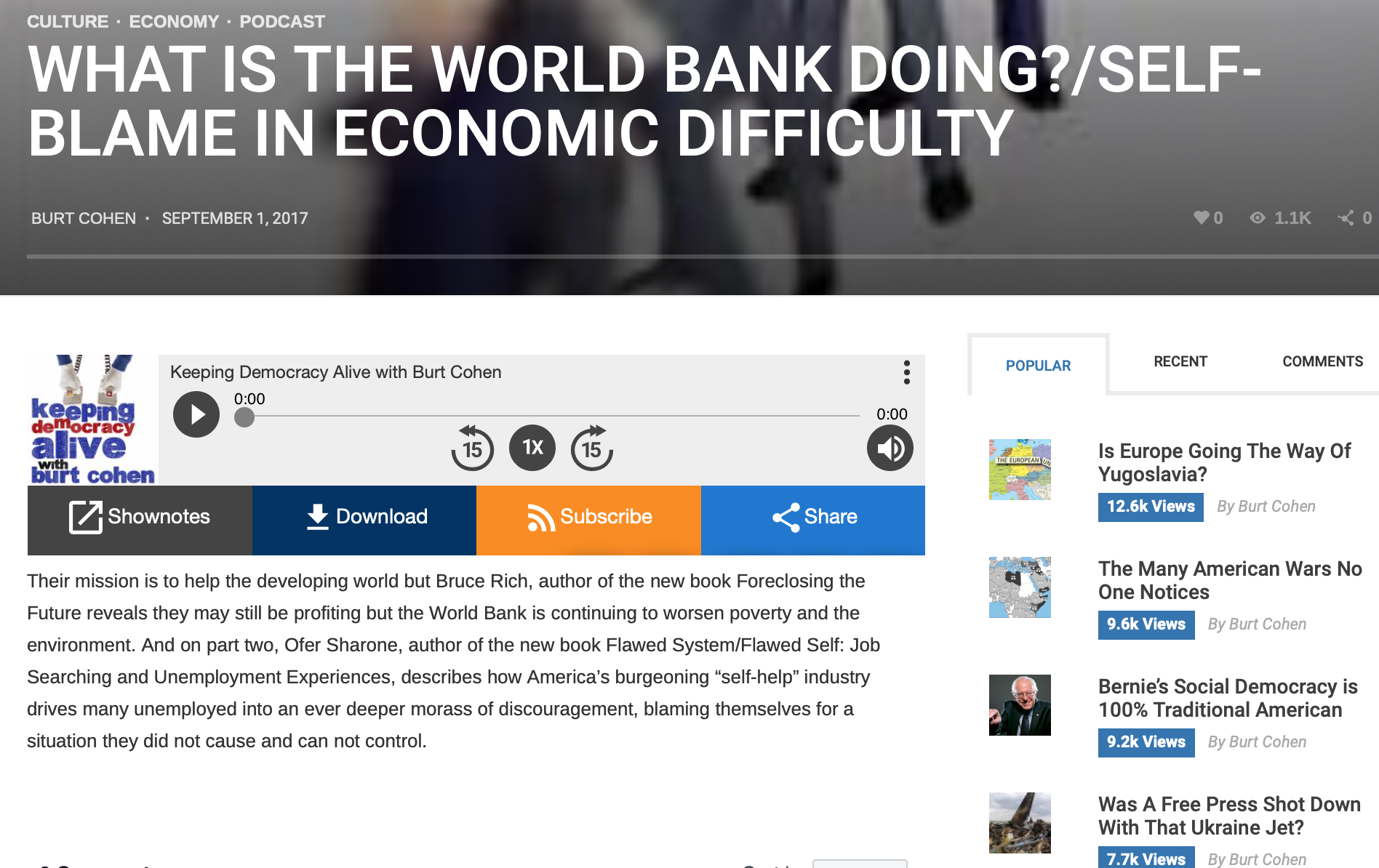 Radio Interview and Discussion on Foreclosing the Future, with former New Hampshire State Senator Burt Cohen, on Portsmouth NH based "Keeping Democracy Alive"
Radio Interview and Discussion on Foreclosing the Future, with former New Hampshire State Senator Burt Cohen, on Portsmouth NH based "Keeping Democracy Alive"
about: http://keepingdemocracyalive.com/world-bank-doing-self-blame-economy/
direct link to audio interview (interview begins at 1:18, ends at 29;38; unusual musical interlude ('international loan sharks') minute 29:39 to 30:49): https://content.blubrry.com/keeping_democracy_alive/WorldBank_UnemploymentBlame.mp3



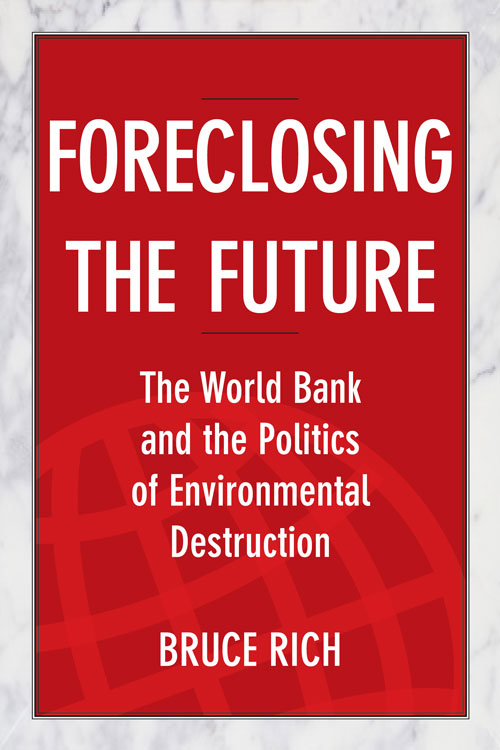

_ForeclosingTheFture_July16.png)